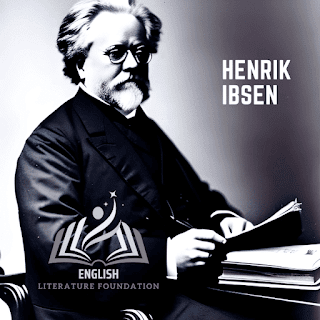The Life and Legacy of Henrik Ibsen
Henrik Ibsen is a renowned Norwegian playwright who is
considered as the father of modern drama. His works have greatly impacted the
literary world and still remain relevant to this day. This article aims to
provide a comprehensive overview of the life and legacy of Henrik Ibsen.
Introduction
Henrik Ibsen was born on March 20, 1828, in Skien, Norway.
He was the eldest son of Knud Ibsen, a successful merchant, and Marichen
Altenburg, a woman who came from a wealthy family. Ibsen spent his childhood in
different parts of Norway, including Skien, Grimstad, and Bergen. He showed an
early interest in writing and theater, and after finishing his education, he
pursued a career in theater.
Early Life and Education
Ibsen's early life was marked by financial difficulties and
family problems. His father's business failed, and the family was forced to
move several times. Ibsen was sent to a boarding school in Grimstad when he was
seven years old, where he excelled in academics but struggled with the strict
discipline. He developed a passion for literature and began writing poetry and
plays.
Early Career and Works
After completing his education, Ibsen moved to Oslo and
started working as an apprentice in a pharmacy. He continued to write and
submitted his first play, "Catiline," to the Norwegian Theater in
Oslo. The play was rejected, but Ibsen did not give up. He continued to write
and eventually became a playwright for the Bergen Theater.
Breakthrough Plays
Ibsen's breakthrough came with his play "Brand,"
which was first performed in 1865. The play explores the conflict between
individualism and social norms and is considered a masterpiece of Norwegian
literature. This was followed by "Peer Gynt," which is now considered
as one of Ibsen's most popular works.
Later Life and Works
In 1874, Ibsen moved to Italy, where he spent the rest of
his life. He continued to write plays and published some of his most famous
works, including "A Doll's House," "Ghosts," and
"Hedda Gabler." These plays challenged social norms and explored
controversial themes such as gender roles, marriage, and morality.
Impact on Literature and Society
Ibsen's works had a profound impact on literature and
society. He is credited with creating modern drama and influencing the works of
many playwrights who came after him. His plays were not only popular but also
controversial and sparked debates on important social issues.
Legacy
Ibsen's legacy is a rich and complex one. He is widely
regarded as one of the most important playwrights in the world, and his works
continue to be performed and studied to this day. His impact on the literary
world and society cannot be overstated, and his legacy lives on through his
plays and the many adaptations and influences they have inspired.
Ibsen's Writing Style
Ibsen's writing style is characterized by realism,
symbolism, and psychological complexity. He was a master of dialogue and used
it to explore the inner workings of his characters' minds. His plays often
contain long monologues and poetic language.
Themes and Motifs
Ibsen's plays explore themes that were ahead of his time,
including the role of women in society, the hypocrisy of the middle class, and
the conflict between individuality and social norms. He also used motifs such
as birds, flowers, and light and darkness to symbolize deeper meanings in his
plays.
Characters
Ibsen's characters are complex and multi-dimensional, often
struggling with their inner desires and societal expectations. His female
characters, in particular, were groundbreaking in their portrayal of women as
independent and strong-willed individuals. Nora Helmer from "A Doll's
House" and Hedda Gabler from "Hedda Gabler" are two of his most
famous female characters.
Symbolism
Ibsen used symbolism extensively in his plays to convey
deeper meanings and themes. In "A Doll's House," the macaroons that
Nora secretly eats symbolize her rebellion against societal norms. In
"Ghosts," the orphanage and the sunken ship symbolize the past that
haunts the characters.
Reception and Criticism
Ibsen's plays were not universally praised when they were
first performed. Many critics found them shocking and offensive, and some of
his plays were even banned in certain countries. However, over time, his works
gained critical acclaim and became some of the most celebrated plays in the
world.
Controversies and Censorship
Ibsen's plays were controversial in their time and faced
censorship and banning in many countries. "A Doll's House" was
considered scandalous for its portrayal of a woman leaving her husband and
children. "Ghosts" was banned in some countries for its depiction of
taboo subjects such as venereal disease and incest.
Adaptations and Influences
Ibsen's works have inspired numerous adaptations and have
been translated into many languages. His plays have been adapted into films,
operas, and ballets. Many playwrights and authors have been influenced by his
writing style and themes, including Tennessee Williams, Arthur Miller, and
Edward Albee.
Conclusion
Henrik Ibsen was a revolutionary playwright whose works
continue to impact the literary world and society. His plays challenged social
norms and explored controversial themes in a way that was ahead of his time.
His legacy lives on through his plays and the many adaptations and influences
they have inspired.

